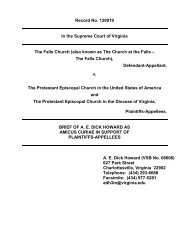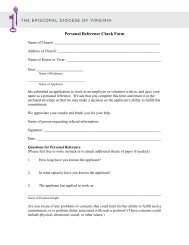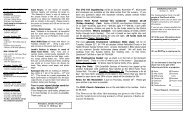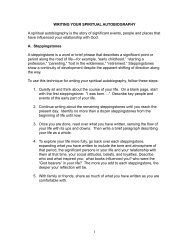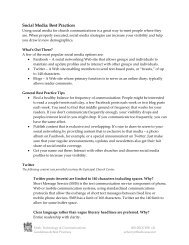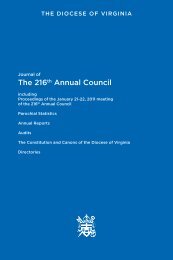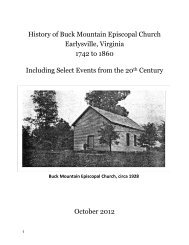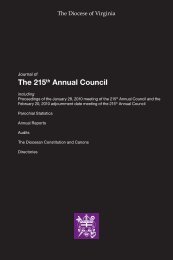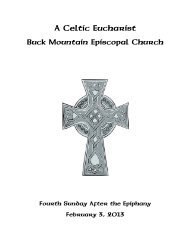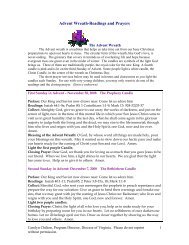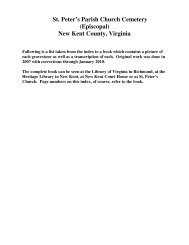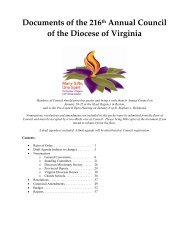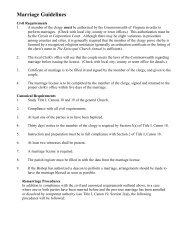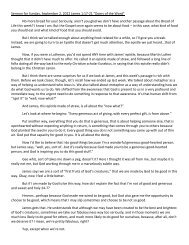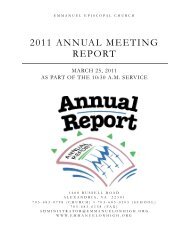The 213th Annual Council - Diocese of Virginia
The 213th Annual Council - Diocese of Virginia
The 213th Annual Council - Diocese of Virginia
Create successful ePaper yourself
Turn your PDF publications into a flip-book with our unique Google optimized e-Paper software.
Proceedings<br />
to appoint a group that is as representative as possible <strong>of</strong> the variety <strong>of</strong> viewpoints that are<br />
held in this <strong>Diocese</strong>. It’s for others to decide whether he succeeded in doing so, but I believe<br />
that, at least on this, the matter <strong>of</strong> the blessing <strong>of</strong> same-sex unions, that this is a truly diverse<br />
group. I’d like to recognize and thank the members <strong>of</strong> the commission for their service over<br />
the past year: the Rev. Chuck Alley, St. Matthew’s, Richmond; Gussey Bannard, St. Stephen’s,<br />
Richmond; Frank Baxter, Calvary, Front Royal; Mary Causey, St. John’s, West Point; the Rev.<br />
Sue Eaves, St. Thomas’, Richmond; the Rev. Sarah Kinney Gaventa, Emmanuel, Greenwood;<br />
the Rev. Rick Lord, Holy Comforter, Vienna; the Rev. Cuthbert Mandell, Aquia, Stafford; Ms.<br />
Jamie Robinson from St. Anne’s, Reston who unfortunately could not be here with us today<br />
because <strong>of</strong> work commitments; the Rev. John Thomas Sheehan, Church <strong>of</strong> Our Redeemer,<br />
Aldie; and Mr. Alex Slaughter, St. James’s, Richmond.<br />
Our task force was given two responsibilities. <strong>The</strong> first responsibility came directly from<br />
the language <strong>of</strong> the resolution passed last year: “To discern a possible emerging consensus<br />
regarding the permitting <strong>of</strong> local option for the blessing <strong>of</strong> same-sex unions.” <strong>The</strong> second<br />
responsibility came from Bishop Lee’s charge in establishing this commission, in which he<br />
said that he believes that it is important for this commission to discern a way forward that<br />
is pastorally responsive to the gay and lesbian Christians in our midst while, at the same<br />
time, being mindful <strong>of</strong> our membership in the wider body <strong>of</strong> the Anglican Communion.<br />
An important word in both <strong>of</strong> those charges is the word “discern.” <strong>The</strong>re is, as you know,<br />
a difference between democracy and discernment. Democracy seeks the will <strong>of</strong> the<br />
majority. Discernment seeks the will <strong>of</strong> God. If the Church were primarily concerned<br />
with democracy—seeking the will <strong>of</strong> the majority— then it would act like a legislative<br />
body when gathered together, and we’d spend a lot <strong>of</strong> time taking polls, distributing and<br />
processing surveys in order to better understand our constituents’ points <strong>of</strong> view, and<br />
then crafting legislation that to reflect that—legislation that would, when we’re gathered<br />
together, be debated, marked up in committee and then put to a vote with majority ruling.<br />
If, on the other hand, the church were concerned primarily with discernment—seeking<br />
the will <strong>of</strong> God—then it would not act like a legislating body, but a discerning body. I<br />
read, somewhere, a pretty good metaphor: that the Church could even be considered the<br />
body <strong>of</strong> Christ, and we, individually members <strong>of</strong> it. <strong>The</strong> author went on to say that the<br />
eye cannot say to the hand, “I have no need <strong>of</strong> you,” nor the head to the feet, “I have no<br />
need <strong>of</strong> you,” or as Eugene Peterson wonderfully paraphrases that, “I want you to think<br />
about how this keeps your significance from getting blown up into self importance, for<br />
no matter how significant you are, it’s only because <strong>of</strong> what you are a part <strong>of</strong>.”<br />
So seeing ourselves as part <strong>of</strong> the Body <strong>of</strong> Christ instead <strong>of</strong> part <strong>of</strong> a legislative process<br />
was an important step. It freed us from the illusion that there can be a resolution to a<br />
complex, ongoing and controversial matter. It forced us to pay careful attention to each<br />
other, not because each person up here has a right to their opinion but because one never<br />
knows through whom the Holy Spirit might be speaking. And most <strong>of</strong> all, it meant that<br />
our work, our focus, was to discern—be engaged in the work <strong>of</strong> the Holy Spirit.<br />
So, we began each meeting with a time <strong>of</strong> prayer, in reflection on Scripture. We<br />
discussed issues <strong>of</strong> theology, sexuality, scriptural authority, church discipline and polity.<br />
Occasionally, we would even try to keep things in perspective, reminding ourselves that<br />
this is not the only time in Church history where there’s been controversy and conflict,<br />
and that the Episcopal Church is not the only denomination trying to live out the Gospel<br />
in a society where differences in sexual orientation are openly discussed and increasingly<br />
acknowledged in all areas <strong>of</strong> public life.<br />
94<br />
<strong>The</strong> <strong>Diocese</strong> <strong>of</strong> <strong>Virginia</strong> t Journal <strong>of</strong> the the 213 th <strong>Annual</strong> <strong>Council</strong>



